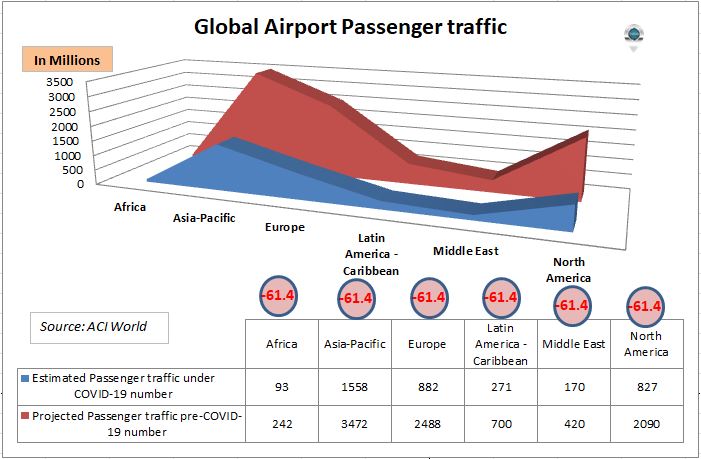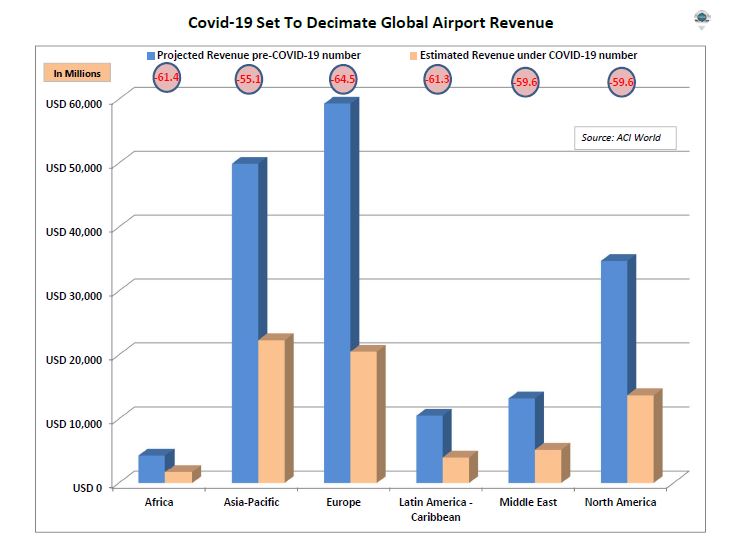A recent report from Airports Council International (ACI) has now revealed significance of COVIDE-19 impact on global civil aviation business and how a 60 percent drop in airport revenue and passenger numbers has become a threat to the industry’s existence.
The month of September marked more than six months since COVID-19 was declared a pandemic on 11 March 2020 by the World Health Organization (WHO). Air transport has remained one of the hardest-hit global industries since the very beginning of the global health crisis. In March, the virus outbreak got out of control, with a rapid rise in daily confirmed cases across numerous countries.

In its fourth economic analysis bulletin – The impact of COVID-19 on the airport business – ACI has revealed that the airport industry is anticipating a -59.6% reduction in passenger volumes in 2020 vis-à-vis the projected baseline (pre-COVID-19 forecast for 2020) and a -58.4% reduction in passengers as compared to 2019. This equates to a reduction in passengers of -5.6 billion for the year.
Along with this, the airport industry is anticipating a -60% reduction in revenues as compared to the projected baseline. Revenues declined by -$10.3 and -39.5 billion (figures in US Dollars) in Q1 and Q2 2020, respectively, compared to the projected baseline. The revenue shortfall is expected to lessen to -$33.4 and -21.1 billion in Q3 and Q4 2020, respectively reaching an unprecedented $104.5 billion reduction in revenue for 2020 which heavily impacts the airport business

ACI also highlighted a significant level of uncertainty surrounding the recovery trajectory, predicting that, by December, monthly traffic may reach between 27% and 60% of the projected baseline for December 2020. The most likely baseline scenario suggests passenger traffic volumes to reach 56%, ACI found.
Globally, passenger traffic volumes are forecast to not recover to 2019 levels before 2023 and markets that have significant international traffic will not recover until 2024.
“Airports are key drivers of economic development but, without any support from governments and with $104 billion in losses because of the devastating impact of the pandemic on aviation, it is now the time to come together to support recovery,” ACI World Director General Luis Felipe de Oliveira said. “Aviation will be central to the global economic recovery, delivering connectivity, trade, tourism, jobs, prosperity and growth.
“As air transport has always been an industry based on the interdependence of all its parts, the COVID-19 crisis devastated all stakeholders—from aircraft manufacturers and travel agents to retailers in airports—and resulted in job losses, business shutdowns, bankruptcies, and other instances of economic devastation.
“Beyond the immediate and apparent damages, the global economy has been hit hard by the loss of the benefits arising from air transportation activity. Indeed, according to the Air Transport Action Group (ATAG), as of 2018, aviation supports 65.5 million jobs worldwide and enables $2.7 trillion in global GDP.
“The recovery of air travel is crucial in the wider global economic recovery but, to succeed, it will need passengers to have confidence in the industry’s focus on their health and welfare.”
ACI has provided support and assistance for airports including initiatives like the Check & Fly app and its global Airport Health Accreditation programme to help them demonstrate that health and safety is the industry’s number one priority.
ACI World has also called on governments to follow a robust and consistent protocol for testing which should be implemented only when necessary and as an alternative to broad-brush requirements for quarantine.
“Unnecessary quarantine measures are harmful to passenger confidence so harmonized measures and a risk based approach that relies on scientific evidences will help to restore the traveller confidence and support the economy recovery of the aviation ecosystem,” Luis Felipe de Oliveira said.
Macroeconomic context: a grim outlook—from virus to debt crisis
Since the release of the previous economic impact assessment in May which referenced the April 2020 World Economic Outlook of the IMF, the global economic institution downgraded its growth projections: according to the latest figures published in June, the decline in global GDP is now estimated at -4.9% for the year 2020, while the recovery is projected to be more gradual than previously forecasted. Global growth is projected at 5.4% for the year 2021.
Even though this projection might inspire optimism at first sight, one should understand that this would leave the global GDP for 2021 6.5 percentage points lower as compared to pre-COVID-19 projections as of January 2020. It is an uncomforting figure which reflects the decline in compensation of employees, corporate profits as well as other types of income including returns on investment and rents.
According to the International Labour Organization (ILO), as of June 2020, 93% of people are employed in countries with workplace closures, while almost third (32%) live in countries with required workplace closures for all but essential workplaces. It is estimated that the global labour force saw a 14% decline in working hours, while an equivalent of 400 million full-time jobs vanished from the global economy, with the largest reduction occurring in the Americas (-18.3%). Finally, it is estimated that 510 million women, equivalent to 40% of all employed women, are employed in the hardesthit sectors of the global economy, such as tourism, hospitality, and air transport.
Finally, it is impossible to overlook the looming debt crisis. According to the Institute for International Finance—the global association of the financial industry, with close to 500 members from 70 countries including most of the world’s largest commercial banks and investment banks, global debt hit a record high of 331% of global GDP in the first quarter of 2020, or over $258 trillion in absolute terms. The pace of global debt build-up by governments, the corporate sector and households is expected to further accelerate in the second and third quarters of 2020.
Source : ACI World

hello there, your post is perfect.Following your articles.
Thanks Tyra
[…] Vanishing traffic, a collapse in revenues, and rising business risks for Global Airports […]